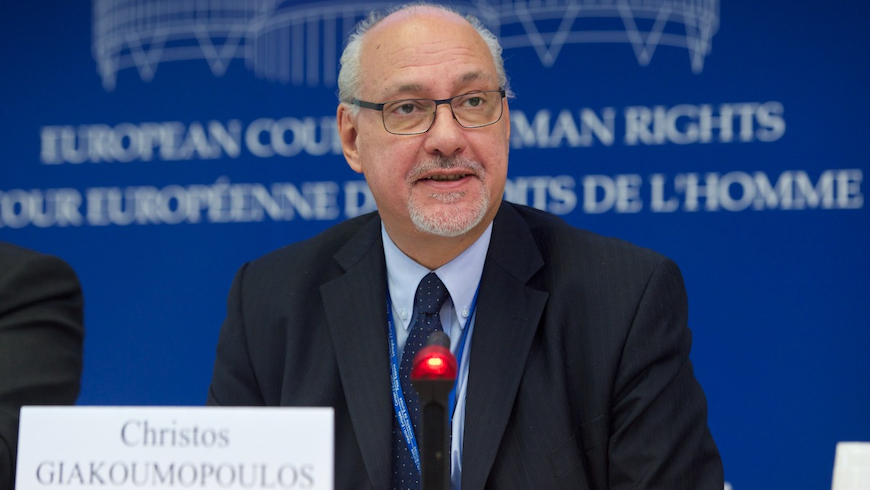Opening remarks by Christos Giakoumopoulos
Conference on Appeal and Individual Application to the Constitutional Court
1 June 2017, Istanbul
President Arslan,
Minister of Justice,
Esteemed and honourable judges and prosecutors,
Excellencies, Ladies and Gentlemen,
It is a great honour for me to be here today in Istanbul for this Conference on Appeal and Individual Application to the Constitutional Court. We are looking forward to this as a moment of reflection, following the times of turbulence that Turkey has been experiencing since last year, and which we all hope will be drawing to a close very soon. In this connection, let me reiterate my deepest sympathy, and continued solidarity with Turkey following the coup attempt of last July, and also with regards to the despicable terrorist attacks that have taken place in Istanbul and other places.
What brings us together today – judges from a variety of backgrounds, prosecutors, lawyers, and academics – is our common aspiration for justice, a passion for legal work, and our understanding of the importance of the judiciary in a society. The project which enabled today’s meeting, a joint venture financed by the European Union, the Council of Europe, and the Republic of Turkey, was created to promote this shared vision and to reinforce the Turkish judiciary, particularly with respect to individual applications to the Constitutional Court.
The individual application procedure, which was introduced in 2010 and entered into force in 2012, has been an essential feature of the Turkish system for the protection of human rights. In many cases, the individual application system has helped to quickly redress human rights violations occurring in Turkey, directly within Turkey. We fully support this system, which is consistent with the principle of subsidiarity that is promoted by the European Convention of Human Rights.
In this connection, I recall that the European Court of Human Rights has recognised the Turkish system of individual application as an effective domestic remedy in the sense of Article 13 of the European Convention on Human Rights. Hence, it has declared inadmissible cases where Turkish applicants did not avail themselves of the individual application system before lodging complaints in Strasbourg, including in the aftermath of the coup (see, for example, the cases of Mercan v. Turkey, application no. 56511/16; Zihni v. Turkey, application no. 59061/16; and çatal v. Turkey no. 2873/17). For example, in the case of Zihni v. Turkey where a teacher had been dismissed by decree-law, the European Court of Human Rights held that there were no particular circumstances in this case which absolved the applicant from his obligation to make use of domestic remedies available under Turkish law, namely an administrative action and an individual application to the Constitutional Court. Naturally, the Strasbourg Court will continue to examine the cases of individuals who still wish to introduce an appeal after they have exhausted all remedies available in Turkey.
Ladies and Gentlemen,
Turkey has been going through extraordinary circumstances, and understandably, it is still experiencing the rippling effects of that profound shock. Up until July last year, the efficiency of the Constitutional Court in processing individual applications had been consistently on the rise. Today, the Constitutional Court is confronted with a tremendous number of applications (over 70,000), most of which have been lodged in connection with the state of emergency, and concern people who are currently held in detention. Such a large volume of cases could be expected in any country undergoing similarly difficult circumstances. Yet, until those legal proceedings conclude, the rights of people are still at stake.
In his speech at the occasion of the Constitutional Court’s anniversary last April, President Arslan pointed out to recent judgments of the Constitutional Court, which have wisely underlined that the rationale for the adoption of emergency measures is precisely to protect the constitutional order. Accordingly, the Constitutional Court, as the guardian of the Constitution, shall guarantee that the necessary safeguards exist against any form of arbitrariness, including in respect of deprivation of liberty, the right to a fair trial, and the right of appeal. We expect that these pending cases will be dealt with by the Constitutional Court in a timely manner.
Let me also welcome some positive developments concerning the emergency measures adopted such as the reduction of the duration of police custody from 30 days to a maximum of seven days, and most importantly for our discussions, the establishment of a Commission to examine ongoing proceedings under the state of emergency. The Commission is instrumental to alleviate the burden of the Constitutional Court. It will afford a system of redress for all individuals who have been dismissed from public service and educational institutions, as well as for all the organisations which have been closed in application of state of emergency decrees.
In all cases where the Commission does not rule in their favour, it will still be possible for applicants to appeal to relevant courts, and eventually introduce an application to the Constitutional Court, as well as to the European Court of Human Rights once domestic remedies have been exhausted. Dismissed judges and prosecutors, on the other hand, will be able to have their case examined by the Council of State. Let me convey the Council of Europe’s readiness to provide the required assistance to Turkey, in particular by supporting the new Commission in its challenging task.
Ladies and Gentlemen,
As we consider how the Turkish judiciary may best navigate through this delicate period, I must share with you my concern for what I see as one of the most daunting challenges lying ahead; the need to preserve social cohesion. We have witnessed how the coup attempt has shaken many Turkish institutions at their core. Undeniably, the last year has been very damaging in terms of trust among citizens. We should avoid the risk of creating deeper divides that could be harmful to society in the long run by trying to preserve stability to the detriment of those rights and liberties of citizens that the Constitution protects.
In considering any interference with the freedom of expression or the freedom of assembly, the European Court of Human Rights typically asks the following questions. Is such interference necessary in a democratic society? Is it proportional to the objectives that it seeks to serve, for instance, maintaining the public order? In this emerging area of its case law, the Constitutional Court of Turkey has been relying on a similar reasoning, and it has reached the same conclusions as the Strasbourg Court.
Statistical information [submitted by the Turkish authorities to the Council of Europe Committee of Ministers] still shows that Article 216 of the Criminal Code, and Article 7 of the Anti-Terrorism Law, continue to be widely applied to initiate investigations or to lodge indictments, especially against journalists. This can only lead to a ‘chilling effect’ on those who wish to express their views on matters of public interest. It creates a detrimental climate of self-censorship, as the European Court of Human Rights has consistently stressed in its case law (see, for example, Altuğ Taner Akçam v. Turkey, application no. 27520/07; and Nedim Şener v. Turkey, application 38270/11).
Specific and targeted measures and safeguards are necessary to ensure that Turkish law and practice do not allow the imposition of disproportionate measures, especially detention, in the context of the exercise of freedom of expression. These principles, as set out in the case law of both the Constitutional Court of Turkey and the European Court of Human Rights need to be fully applied.
Ladies and Gentlemen,
I have shared with you my strong belief in the individual application as an essential aspect of the protection of fundamental rights, which the Council of Europe is committed to support through the present project. Nevertheless, one can never stress enough that the individual application is only one part of a larger national system for justice and human rights, which takes an entire judiciary to achieve. As some judges serving in the various branches of the Turkish judiciary have highlighted in previous meetings, the Constitutional Court of Turkey is not the only Turkish Court with the responsibility to implement the European Convention for Human Rights; other courts have also been fulfilling this essential function [and need to be recognised for their important role too]. This is why this project is attaching particular importance to judicial dialogue, which we aim to support through a series of Case Law Fora, and other activities such as the present conference.
In closing my remarks, let me underline the following: It is clearly established and unanimously accepted that the jurisprudence of the European Court of Human Rights concerns all Turkish courts. By the same token, it is only reasonable to expect that the Turkish judiciary applies the same standards and principles as the Constitutional Court – a high court of last resort. Thus, there is no possible questioning of whether the Turkish judiciary should follow the Constitutional Court’s judgments as a matter of principle, or rather on a case-by-case basis. Some might recall Article 153 of the Turkish Constitution, according to which decisions by the Constitutional Court are binding over all legislative, executive and judicial organs. On my end, I appeal to your sense of responsibility for preserving the legal order, and ensuring consistency of interpretation in order to minimise the number of cases at the level of the Constitutional Court, and shield the individual application system from paralysis.
Let me reiterate the commitment of the Council of Europe to our long standing and fruitful cooperation. I also wish to express my sincere appreciation to Mr Sözüer, Dean of Law Faculty and the University of Istanbul, our partner for the organisation of this event.
I wish you all a productive conference, and thank you for your kind attention.




